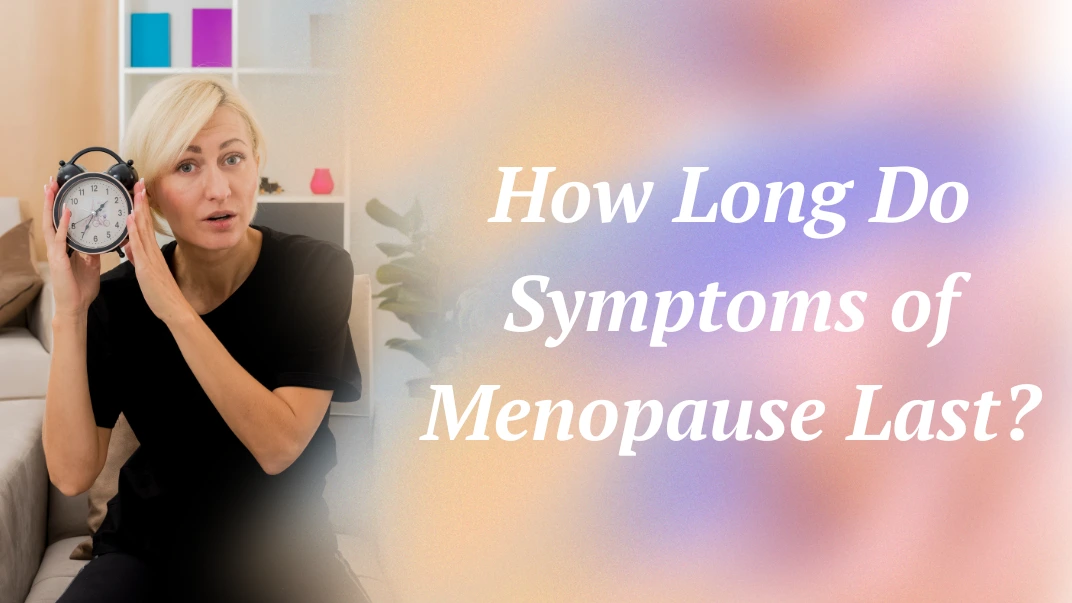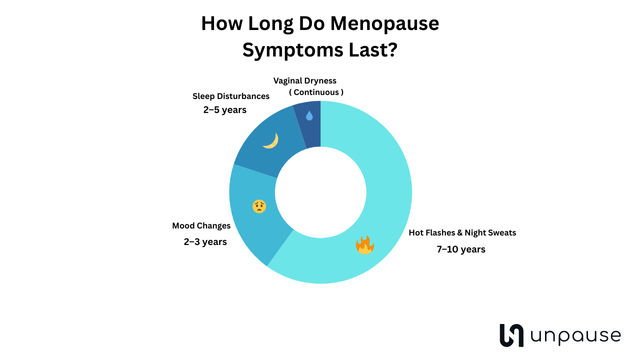How Long Do Menopause Symptoms Last?
December 14, 2024

Menopause symptoms usually start in a woman's late 40s to early 50s, and the length of time they last can differ from person to person. Generally, these symptoms can persist for about 4 to 10 years, although some women may find their experience is shorter or longer. The intensity and duration of symptoms such as hot flashes, night sweats, mood swings, and alterations in menstrual cycles are affected by hormonal changes during this period.
This article delves into the stages of menopause, the 34 symptoms associated with it, and offers guidance on how to approach this transition with resilience, self-care, and support.
The Stages of Menopause
Menopause is not a singular event but a progression through three distinct stages:
1. Perimenopause: The Prelude to Change
Perimenopause begins years before menopause, typically in a woman’s 40s, though it can start as early as age 35. Hormonal fluctuations during this period can lead to irregular periods, hot flushes, and mood swings. On average, perimenopause lasts between 4 to 8 years, but this can vary widely.
Signs of menopause at 40: Irregular periods, sleep disturbances, and increased PMS-like symptoms may indicate the onset of perimenopause in your 40s.
2. Menopause: The Turning Point
Menopause is defined as 12 consecutive months without a menstrual cycle and usually occurs around age 51 for most women. This stage signifies the end of fertility and is often when symptoms like hot flushes, night sweats, and sleep disturbances are most intense.
What are the first signs of menopause? Common early signs include irregular periods, hot flushes, and mood changes.
3. Postmenopause: The New Normal
Postmenopause begins after menopause and continues for the rest of a woman’s life. While many symptoms gradually diminish, some—such as vaginal dryness and bone density issues—may persist without proper intervention.
Post-menopause symptoms at age 60: Vaginal dryness, urinary incontinence, and increased risk of osteoporosis are common at this stage.
How Long Do Menopausal Symptoms Last?
The duration of menopausal symptoms varies widely:
Hot Flashes and Night Sweats
These iconic symptoms affect up to 75% of women and can persist for an average of 7–10 years. For some, they extend beyond a decade, even into their 70s.
Mood Changes
Irritability, anxiety, and depression are common during perimenopause but often subside within a few years post-menopause.
Sleep Disturbances
Insomnia, fueled by night sweats and hormonal shifts, may last several years but tends to improve with lifestyle adjustments or medical treatments.
Vaginal Dryness
Unlike other symptoms, this can persist indefinitely without intervention, as estrogen levels remain low after menopause.

This infographic has been created based on the study published in verywellhealth, resources.healthgrades, clevelandclinic
The end of menopause symptoms is often marked by a decrease in the frequency and severity of hot flushes, a stabilization of moods, and improved sleep patterns. These changes signify the body’s gradual adjustment to its new hormonal baseline.
The most intense symptoms typically occur during menopause itself. This stage, defined by 12 consecutive months without a menstrual cycle, is often accompanied by the height of hot flushes, night sweats, and significant emotional fluctuations. These challenges make this period particularly demanding for many women.
For most, menopause symptoms persist for about 4 to 8 years, though the timeline varies widely. Certain symptoms, such as hot flushes, may continue even longer for some individuals. On average, menopause symptoms last around 7 years, but this duration is influenced by factors such as genetics, lifestyle, and overall health. Each woman’s experience is unique, underscoring the importance of personalized care and attention during this transformative phase.
Thriving Through Menopause
While menopause symptoms can be tough, they also offer a chance to focus on self-care and embrace healthy habits. Here’s how:
Lifestyle Changes
- Exercise: Engaging in regular physical activity helps reduce stress, boosts mood, and supports bone health.
- Nutrition: A well-balanced diet that includes calcium, vitamin D, and omega-3 fatty acids is crucial.
- Sleep Hygiene: Sticking to a consistent bedtime routine can help alleviate insomnia.
Medical Interventions
- Hormone Replacement Therapy (HRT): This can be effective for managing hot flushes and maintaining bone health, though it may not be suitable for everyone.
- Non-Hormonal Options: Medications such as antidepressants or gabapentin can help relieve certain symptoms.
Alternative Therapies
- Acupuncture: Some women find relief from hot flushes and mood swings through acupuncture.
- Herbal Remedies: Black cohosh and red clover may provide benefits but should be taken under medical supervision.
When to Seek Help
Although menopause is a natural process, some symptoms may need medical attention:
- Ongoing vaginal bleeding after menopause.
- Symptoms that significantly disrupt daily life.
- Sudden or unexplained changes in health.
Embracing a New Chapter
Menopause signifies the start of a new stage in life. With the right resources and support, it’s possible to navigate this transition with poise and confidence. Remember, you’re not alone—many women are on this journey, and help is always within reach.
No matter if you're noticing symptoms at 47, 50, or 60, being in tune with your body and pursuing the right care can truly make a significant impact.










































